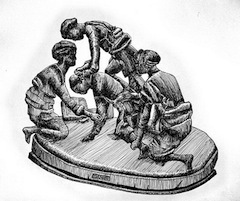Brendan I. Koerner's Blog, page 37
August 26, 2011
The Reset Button

Thanks a mil for bearing with the light posting this week. Was hoping to reward y'all with an entry about Olmec jaguar worship, but the brain ain't working like it should—the consequence of a horrendous JetBlue delay and general work-related exhaustion. Back at full strength after Hurricane Irene passes over Microkhan world headquarters this weekend; in the meantime, please check out the excellent podcast version of my latest Wired story. Major plaudits to the narrator for nailing all those tricky pronunciations, and for making the minutiae of slot-machine hacking seem every bit as sexy as the finest pulp vixens.
August 25, 2011
Back to the Land of the Golden Arcs
Winging my way back to Queens today, after a truly epic reporting trip in Southern California. Can't wait to clue y'all in to the narrative I've been piecing together—it's a doozy, to say the least. As I hurtle eastward through the air at slightly subsonic speed, enjoy a classic Sean Price track—yet another example of hip-hop's excellent use of Lee Mason's "Shady Blues," a tune previously given supreme Microkhan love here.
August 24, 2011
What Would Buddha Do?
I do not believe the prince who renounced the world in order to attain Enlightenment would approve of these copyright shenanigans in Taiwan:
The funeral industry has been rocked by a lawsuit filed by a music company that accuses funeral homes of intellectual property right (IPR) infringement for playing Buddhist chants and pop music during services.
Music and Buddhist chants during funerals are usually provided by the funeral homes, mostly using a gadget called the Electric Buddhism Sutra Player (above) or music CDs.
However, one music company feels the use of the sutra player constitutes as copyright infringement and began recording audio and video footage of services earlier this year at funeral homes all across the nation. It then filed lawsuits against a number of funeral homes, demanding a copyright fee of NT$500.
There's actually an interesting intellectual-property concept at the heart of this brouhaha—namely, whether unique interpretations of previously published material should enjoy some measure of legal protection. (I, for one, would not mind a whit if Lily Allen gets a dash of cash every time someone plays her version of "Womanizer.") But the key there is "unique"—the litmus test should be whether there was creative sweat poured into the endeavor. In the case of these sutra players, the only hard work consisted of coding the ancient tunes onto chips. I very much doubt the programmers thought they were adding a new level of insight.
As is so often the case in situations like this, most Taiwanese funeral homes are reacting not by coughing up the requested money, but rather by simply putting the grieving families in charge of the music—thereby removing the commercial element of the "performance." How the maker of the Electric Buddhism Sutra Player didn't see that maneuver coming from a mile away is beyond my powers of comprehension.
August 22, 2011
Komrad Ivan

Greetings from a rather random corner of Southern California, where I find myself pursuing the heart-and-soul of my next book. While I'm busy interviewing an eyewitness to historic events that the bulk of Americans have long forgotten, please take a moment to delve into the University of Nebraska's rich trove of government-issued comics. Given Microkhan's longtime fascination with all things Soviet—damn you, Amerika and Hendrick Smith—the illustrated booklet about the technology of Warsaw Pact armies(above) couldn't help but make an impression. An early precursor to the PowerPoint presentation, perhaps.
August 19, 2011
The Ponchos: Ruocheng Ying in The Last Emperor
 After a hiatus of a few weeks, it's time to award another Poncho, the greatest honor that Microkhan can bestow upon the minor players of cinema. As a few of you may recall, the prize is given to supporting actors for the utterance of memorable single lines—lines that, in far less capable hands, would have made no impression on the audience whatsoever.
After a hiatus of a few weeks, it's time to award another Poncho, the greatest honor that Microkhan can bestow upon the minor players of cinema. As a few of you may recall, the prize is given to supporting actors for the utterance of memorable single lines—lines that, in far less capable hands, would have made no impression on the audience whatsoever.
This time, the honoree is Ruocheng Ying, who played a prison official in Bernardo Bertolucci's The Last Emperor. His Poncho-worthy performance takes place toward the film's end, when Pu Yi, once the ruler of China, finds himself incarcerated for various crimes committed as a Japanese Quisling in Manchukuo. Once considered heaven's choice to rule the Middle Kingdom, Pu Yi is now a broken man who only wishes to tend to his flowers. Ying's character confronts him in the prison yard, trying to understand how the ex-monarch could have lost every scrap of his former hubris. In the midst of their back and forth comes this line, which is my foremost memory from the movie:
All your life you thought you were better than everyone else, now you think you're the worst of all!
What I love about Ying's delivery of this line is how he imbues it with genuine consternation. You get the sense that his character simply can't understand Pu Yi's transformation, and that the totality of the former emperor's fall has left him with deep philosophical questions about the impermanence of life itself. If the mightiest man in China can end up a meek prison flower tender, does this mean that every one of man's achievements is built on a foundation of sand? That all that brings a man happiness in life—his family, his career, his friends—can vanish in an instant?
I'd like to think Ying's line spurred my lifelong interest in characters who turn their backs on money and fame, having decided there is much more to life than raw success. (Case in point: Big Rich Williams.) I'd say that makes the performance quite deserving of a Poncho, wouldn't you?
(Pu Yi painting by Christian Develter)
August 18, 2011
Drop and Gimme Twenti
An otherwise innocuous story about Fiji's efforts to combat littering reveals this golden information nugget about law enforcement in Papua New Guinea:
"We did some relative studies and found that in Papua New Guinea if you are found littering – you are asked by the authority to do push-ups. For us here we tell them to pick their rubbish up immediately and also clean the surrounding environment," Mrs Tagicakibau said.
I haven't been able to confirm this factoid, but if it's true, it represents a lot that ails Papua New Guinea. For starters, there is no mention of push-ups in the nation's criminal code, meaning that the cops just made this punishment up on their own—a hint that there's a serious break down in the rule of law. Second, has anyone in Port Moresby bothered to study the Stanford Prison Experiment? I thought that provided fairly good evidence that using push-ups as punishment was a recipe for disaster.
(N.b., the italicized word in this post's title is Tok Pisin for "twenty." Full dictionary of the language here.)
August 17, 2011
The Empty File

As part of my ongoing, book-related effort to gain a better understanding of the Vietnam War, I recently started diving into the documentary series based on Stanley Karnow's Vietnam: A History. (Yeah, I know, I should've started with the source material—my bad.) I've found the first episode particularly enlightening, since part of my book will deal with French opposition to Vietnam—opposition obviously rooted in France's disastrous experience at Dien Bien Phu. The television version of Karnow's work really nails the exact nature of France's failings, both politically and militarily. A classic case of imperial hubris, or so it would seem.
The quote that best sums up the catastrophe comes from a French captain named Jean Pouget. In recalling the 1953 arrival of General Henri Navarre, the fifth French commander in Vietnam in as many years, Pouget says that a concerted effort was made to develop what might now be termed a "communications strategy." But for some reason, the effort never went anywhere:
When General Navarre arrived, he opened a file right away and on that file I wrote "War Goals." We looked for what to tell the troops. Well, until the end this file remained practically empty. We never could express concretely our war goals.
I reckon the same could be said for the American military a decade or so later. The question I have to address, then, is how this lack of clear goals affected the psychological well-being of the men in the field, especially after their fighting days were done. There is actually a case to be made (most notably by Jonathan Shay in Achilles in Vietnam) that the uncertain nature of the mission in Vietnam contributed to the prevalence of post-traumatic stress disorder among that conflict's veterans. Perhaps it is not only the horror of combat that warps the mind, but also the anxiety of not knowing whether one's supreme sacrifices were truly for a greater good.
(Image above: One of the 3,300 French prisoners-of-war to returns home after Dien Bien Phu. Seven thousand of his comrades perished will in Viet Minh custody.)
August 16, 2011
The King Abides
Plowing back into the book this morning, after losing all of yesterday to Microkhan Jr. duties. Really scrambling to get some work done before heading out to California this weekend, for an interview of the utmost importance. In my brief absence, please check out the latest live mix from DJ Assault, one of the most treasured members of the Microkhan musical pantheon. Great to hear that the man is now running his own record label back in Detroit, the city where I first discovered his vinyl offerings back in the late 1990s. He's been in regular rotation on the digital jukebox ever since, though obviously less so in recent days—permissive as I am, I would have to give back my "Father of the Year" mug if I ever allowed the kid to hear the likes of this.
August 15, 2011
Thuggee Slang
 It's always interesting to note how much criminal slang, which is designed to defy common comprehension, eventually finds its way into the popular vocabulary. I believe this is a testament not only to the (arguably lamentable) glamour of transgression, but also to the accidental linguistic genius of those who rob and maim for a living. Words from the underworld manage to pack a lot of meaning into a modicum of characters, plus they often exhibit a certain visual flair that is lacking in more mainstream language. Which of these, for example, is more evocative of the notion of a fatal stab wound: "puncture" or "Harlem sunset"?
It's always interesting to note how much criminal slang, which is designed to defy common comprehension, eventually finds its way into the popular vocabulary. I believe this is a testament not only to the (arguably lamentable) glamour of transgression, but also to the accidental linguistic genius of those who rob and maim for a living. Words from the underworld manage to pack a lot of meaning into a modicum of characters, plus they often exhibit a certain visual flair that is lacking in more mainstream language. Which of these, for example, is more evocative of the notion of a fatal stab wound: "puncture" or "Harlem sunset"?
If you share my fascination with the lingo of the professionally malevolent, I highly recommend you spend a few sweet moments zipping through Ramaseeana: or, A vocabulary of the peculiar language used by the thugs, which documents the slang employed by India's notorious stranglers of travelers. Because the Thuggees were such a superstitious lot, many of the words and phrases have to do with omens. Kalee kee manj, for example, is the non-fortuitous sound of fighting cats, while bara muttee is the welcome ululation of lizards in the night. Yet there are also much more prosaic pieces of the lexicon that deserve adoption by modern society, including sewalee (a fox), narta (a cop), and kootha (a thief who steals from other thieves).
The word-nerd stuff starts here. Also, it seems that the Thugs, despite their murderous ways, were not totally averse to paying their taxes on time.
(Image via Jonas Liveröd)
August 12, 2011
A Sailor's Life for Me?

Many moons ago, one of my good friend's older brothers spent a summer on an Alaskan fishing boat. He returned with a pocketful of money and some truly harrowing tales of the seafaring life, which included a comrade abandoned off the Aleutian Islands and much drunken thuggery. The anecdote of his that I remember most involves the way in which he and his best friend passed the nights: playing poker and shaving little pieces of their heads, until they ended the voyage completely bald.
I thought of that story upon coming across this account of an Australian helicopter pilot who went "sea crazy" after two months aboard a Taiwanese fishing vessel. He was fortunate in that he had the means to flee to Nauru for a spot of chocolate; most crewmen have no option of seeing land for many months, no matter how bad their psychological ailments become.
I plan on exploring the issue of sailors' mental health in the coming days; I've always been fascinated by the lives of modern seafarers, whose culture of toil and trouble is one of the planet's least chronicled. For the moment, though, I'll start with a rare spot of good news coming out of England: since 1915, the suicide rate for that nation's seafarers' has plummeted (see above). The main factor in the decline appears to be the industry's growing intolerance for drunkenness:
Alcohol and drug abuse are strongly associated with suicide risks. Many of the suicides in this study involved seafarers who had been drinking heavily in the hours leading up to their deaths. A previous Swedish study reported similar findings. However, since the 1970s, there has been a general reduction in the culture of heavy alcohol consumption among seafarers, which has coincided with several factors, including faster turnaround of ships in port with more limited opportunities for seafarers to socialize ashore in foreign countries, reductions in ship crewing numbers, increased use of Asian and other non-European crews, more extensive medical examination procedures and increased implementation of alcohol screening.
And yet I can't help but think that moderate alcohol use has some place in the life of professional seafarers. Didn't the crew of the submarine from Das Boot enjoy the occasional glass of sherry or half bottle of Beck's?




